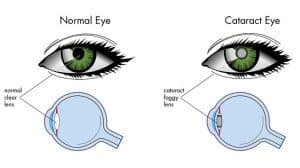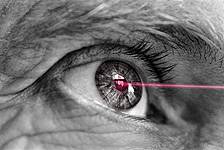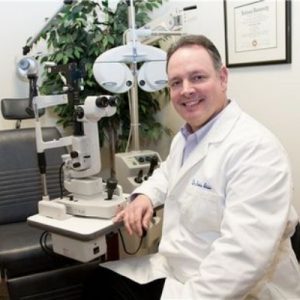Over 50 percent of all adults will begin to develop a cataract by the time they reach 60.
When cataracts first develop, you may not even notice any changes to your vision. However, as cataracts worsen, the clouding effects on your eye’s lens increases in severity, and blurry or distorted vision will begin to affect your performance of daily activities.
You may be experiencing any of the following symptoms:
- Dim, blurred or yellowed vision
- Double vision in one eye
- Reduced contrast and clarity of vision
- Halos around lights
- Difficulty seeing in low-light settings
- Vision loss
- Increase sensitivity to glare
- Visual differences between the two eyes
In most cases, mild to moderate symptoms can be corrected with a stronger optical prescription, eyeglasses that contain magnification lenses, and sunglasses with anti-glare coating.
As cataracts worsen, so will your vision— and this is when surgery will be recommended.
Surgery is the only way to recover clear vision.
Overtime, cataracts can progress to the point that they threaten vision loss. Cataract surgery is the only way to recover clear vision and improve quality of life.
When you begin to notice that daily activities such as reading, driving, watching TV, and crafts have become a challenge, it is time to think about cataract surgery.
Your eye doctor may also recommend cataract surgery if the cataracts are interfering with the treatment of another ocular disease, or preventing a proper examination of the back of your eye.
If you have cataracts, contact an eye doctor near you, who can diagnose and discuss the best treatment options.
SEE RELATED: Will Cataract Surgery Give Me 20/20 Vision?
Is cataract surgery safe?
Cataract surgery is one of the safest and most effective types of surgery.
Cataract surgery is a common, and relatively painless procedure that involves replacing your clouded eye lens with an artificial lens. The artificial lens is a clear, plastic intraocular lens (IOL) that contains an optical power to correct any refractive errors you may have, and improve your vision clarity.
Cataract surgery has proven to be highly successful in restoring vision, while reducing or even eliminating the need for eyeglasses.
- Over 90% of patients report improved vision following cataract surgery.
- Multiple studies show a correlation between cataract surgery and improved quality of life, including a reduced risk of falling and fewer car accidents.
There are two primary approaches to cataract surgery
Small-incision cataract surgery involves a process called phacoemulsification. During this surgery, a tiny probe is inserted into the side of the cornea (the clear outer covering of the eye), through a small incision. The probe emits ultrasound waves that soften and break up the lens to enable easy suctioning from the eye.
Extracapsular surgery involves a larger incision in the cornea to enable removal of the lens core in one piece.
Still unsure if you are ready for cataract surgery?
Performance of many routine activities can become challenging as cataracts worsen. When deciding if cataract surgery is the right choice for you, think about the following:
- Are you finding it increasingly difficult to perform daily and occupational tasks?
- Is your blurred vision affecting your ability to drive or see well at night?
- Are you able to read or watch TV comfortably, without straining your eyes?
- Are you struggling to see labels while you cook or tags and receipts while you shop?
- Do you frequently miss stitches while knitting or crocheting?
- Can you read the instructions on your medication bottles?
- Are faces on photographs difficult to recognize?
- Do you frequently rely on others to complete your routine tasks?
If you have answered yes to most of these questions, it is time to take the next step towards improving your vision.
LEARN MORE: Guide to Eye Conditions
Schedule an appointment with an eye doctor today, to determine if cataract surgery is right for you.










